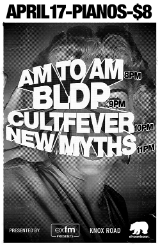
Jamie normally snarks on the music industry and the indie blog scene, but for the next three installments he will explore how the attacks on September 11 changed the course of rock music (note: he’s not talking about pop music, just rock). I know it’s about 9/11, but don’t get all weird about it, ok?
The Lucrative Death of Mainstream Rock
The average age of a top rock band today is over 13 years old. The oldest charting band are the Red Hot Chili Peppers, who are about to celebrate their 30th anniversary. All these bands might churn out new music, but these are the same dudes who have been on the charts since 2002.
Linkin Park, Bush, Chevelle, the Foo Fighters, the list goes on. Mainstream rock music hasn’t changed for an ENTIRE DECADE. That’s unbelievable. Throughout history, the genre has morphed and changed over time, one brand of rock sliding seamlessly into the next.
Bill Haly gave way to Elvis who gave way to the Beatles. The Beatles gave way to Jimi Hendrix and Led Zepplin. After disco and punk, rock got into a sort of exploratory phase. At the end of that phase was Poison. Poison gave way to Guns N’ Roses who quickly gave way to Nirvana.
Then we had 9/11, which turned it all to hell.
Although 9/11 trapped people in a state of emotional anguish, giving the record labels a place to make an easy profit, it wasn’t the only thing that killed rock ‘n’ roll; there was a co-conspirator in the crime. Enter: Napster.
With the rise of the internet in the 2000s came a rise of powerful electronic lawlessness. Napster was the first place you could get any music you wanted for free at the click of a mouse. The music industry fought pirating for some time, but have since had to resort to creative, and less lucrative, solutions.
But they didn’t want to go out without a fight–and as it turned out they didn’t have to. There was one large group that still paid money for physical CDs: aging rock fans. You know, the guys in their 30s who debate the merits of Nickleback vs. Pearl Jam over pizza and beer? (I had the pleasure of sitting through that one).
These fans buy physical music because it’s comfortable, not because it’s trendy. Besides, they’re VERY against downloading music and they don’t know why all the young people do it. “What’s wrong with you kids?” they like to say. Those people are almost single-handedly holding up the record industry.
But as the 2000s went on, the illegal downloading scene got bigger. The bands on the fringes of the rock scene, who couldn’t get a big record deal if it killed them, found a home in indie music. The industry saw customers fleeing left and right.
As a result, the labels put a lot of money into rock. This post-grunge scene happened to be doing very well, so why mess with success, especially when success is so easy? They could explore new and interesting talent, but they could also just pump out more of the same and get great results.
Unfortunately, people age. The industry’s biggest paying demographic is getting older and older, while their brand of rock isn’t getting any younger. But still it exists. It’s aged and decaying body mucks up the airwaves, slowly destroying the genre for good.
At this point all we have are dollar signs playing for us. While these popular bands were once born of good intention and integrity, they are now only shells of their former selves. Very RICH shells of their former selves., might I add. At a solid decade old, this scene has overstayed its welcome.
Successful bands usually evolve with the times. Within their 10-year career the Beatles managed to warp their sound in a half-dozen fascinating and influential ways. What has Nickleback done for you lately? Modern rock bands are doing so little that the veteran bands who should be changing with the times are just reverting back to what they know.
This is bad. While 9/11 didn’t single-handedly kill mainstream rock music, it changed it in just the right way to ease it into death. It drastically changed the emotions of the entire country, and allowed the industry to sneak in and capitalize on the mess.
So what do we do now? Do we leave it sitting there to die? After all, it’s the child of decades of greatness. Jimi Hendrix and John Lennon had a hand in making this thing! Are we supposed to pretend to love it anyway, even through its unbearable yowls of pain? Do we beat it into submission just to put it out of its misery?
There’s no one solution, they’re all equally terrible and painful. But don’t mind me, I’ll just be over here carving out the tombstone for rock music. I haven’t decided on the epitaph. I was thinking “Every Rose Has Its Thorn,” but I think I’ll have to go with “It’s Only Rock ‘n Roll.” Come on, just try to tell me you don’t like it.








